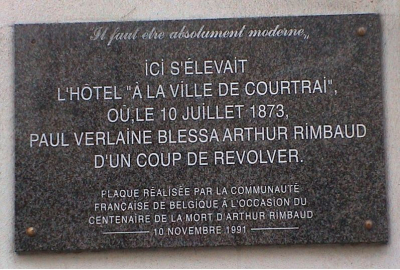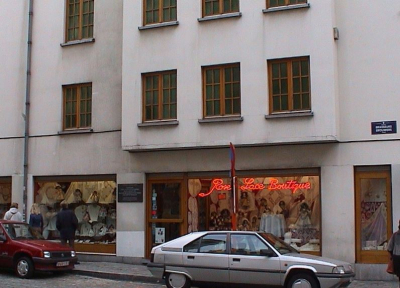Literature and lace don't mix
By ADRIAN TAHOURDIN
Literature can clash with commerce in all sorts of ways, or the two can rub along together. No. 102 Boulevard Hausmann in Paris is where Proust lived from 1907 to 1919, i.e. during his most productive years (���Marcel Proust 1871 ��� 1922 habita cet immeuble de 1907 �� 1919���). An unremarkable five- or six-storey building, it now houses the bank CIC, who are, I imagine, happy to have the plaque to give them a bit of literary cachet.
But it���s a slightly different story in Brussels, apparently. In the first of a six-part series on ���Writers in prison��� in Le Monde recently, Marie-B��atrice Baudet revisited the infamous episode when an inebriated Verlaine shot Rimbaud in a hotel room in July 1873. The hotel in question, the H��tel A la ville de Courtrai on the rue des Brasseurs, is no more (it closed in 1979). Baudet describes it as having been a ���dive near the Grand-Place���, Brussels���s historic centre. On site today is a lace shop whose owners Rose and Jean-Pierre, writes Baudet, ���hate [the] marble plaque erected in 1991 by the French Community of Belgium���. It reads: ���Here stood the H��tel A la ville de Courtrai where, on 10th July 1873, Paul Verlaine wounded Arthur Rimbaud with a revolver shot���. According to Baudet, the owners of the lace shop are unhappy with the tourists who constantly ask them who Verlaine and Rimbaud were ��� they obstruct the entrance to the shop, apparently. Baudet remarks pointedly that the owners are Flemish. Not French-speakers by choice, in other words. Maybe that explains their sense of irritation.
The offending revolver formed the centrepiece of a superb exhibition last year about Verlaine���s time in Belgium, including his period of incarceration in the nearby city of Mons. As Baudet reminds us, it wasn���t an entirely negative experience for the poet: he was exempted from hard physical labour and was provided with writing implements; he also underwent a profound religious conversion. The poetry he produced in this period of religious fervour was, as Baudet writes, ���a long way from the Sonnet du trou du cul composed two years earlier to shock the Parnassian poets, guardians of classical rhyme, the pisseurs de copie, as Rimbaud called them���.
Peter Stothard's Blog
- Peter Stothard's profile
- 30 followers





